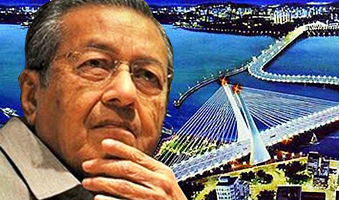Mahathir’s Crooked Bridge: a Chinese perspective

Sin Chew Daily
The Crooked Bridge proposal has once again come into limelight following the installation of the new government under Tun Mahathir, and will likely be incorporated into the government’s development plan very soon.
The issue invariably triggers tremendous contentions among Malaysians and could even have an impact on our vulnerable relationship with Singapore.
Johor menteri besar Osman Sapian says the Crooked Bridge project was the brainchild of Mahathir and he would therefore leave it to the PM to decide on its destiny, and that the state government will offer its cooperation.
As the project needs the coordination from Singapore as well, things have gone rather fast these days. Economic affairs minister Azmin Ali is heading a delegation to the Lion City to discuss the project will the Singapore government.
Osman personally feels that the Crooked Bridge will bring more benefits than harms to the country and will help ease the congestion and pollution on Johor Straits while boosting the visual image of Johor Bahru.
The Singapore government has yet to express its stand. As Singapore previously opposed to the idea of tearing down the aged Causeway to build a brand new bridge, Mahathir unilaterally insisted to construct a crooked bridge entirely on the Malaysian side.
Singapore opposed to the project because it felt it would not benefit from the project and had failed to secure a deal to swap the project with sand and opening of airspace.
Relationship between Malaysia and Singapore plummeted to a low during Mahathir’s previous tenure as prime minister, and the same is expected to change once again following the postponement of the KL-Singapore high speed rail project to after 2020 as well as the tacky water tariff issue. With the Crooked Bridge project now coming into picture to complicate things further, the official stand of Singapore government will become public focus.
The relationship between Mahathir and the two successive prime ministers Abdullah Badawi and Najib Razak soured because they could not get his pet project going. Abdullah was eventually forced to step down while Najib is now facing corruption charges following the collapse of the BN administration.
Given his obstinacy and obsession, it is highly likely that Mahathir will press ahead with the project as in the case of the third national car project.
Does the Crooked Bridge really benefit the country and is it really that necessary? I am sure many will feel that the bridge is not going to significantly solve the perennial congestion problem of the existing Causeway.
Traffic planning experts have earlier stated that the proposed bridge project must take into consideration the existing railway and water pipe alignment as well as safety aspects.
As a matter of fact, the Crooked Bridge is not an urgent project and may not effectively solve the congestion problem. The government should instead invest in infrastructure that may benefit Malaysians more, such as construction of hospitals, schools and roads. Moreover, the country’s current financial situation may not allow us to embark on the Crooked Bridge project.
No Malaysians will oppose to the project if it will really boost the country’s economic development and bring tremendous benefits to the general public. However, if it is carried out purely out of the obsession of a single individual without comprehensive planning on the part of the government, it is poised to impart a largely negative impression among Malaysians.

